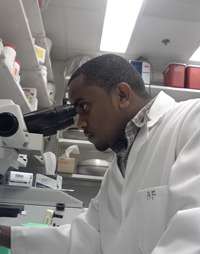Chemical Engineering
“A Correlation between Breast Cancer Risk Factors and Epigenetic Regulation”

The prevalence of obesity has given rise to significant global concerns as numerous population-based studies demonstrate an incontrovertible association between obesity and breast cancer. Mechanisms proposed to account for this linkage include exaggerated levels of carbohydrate substrates, elevated levels of circulating mitogenic hormones, and inflammatory cytokines that impinge on epithelial programming in many tissues. Moreover, recently many scientists have rediscovered the observation, first described by OttoWarburg nearly a century ago, that most cancer cells undergo a dramatic metabolic shift in energy utilization and expenditure that fuels and supports the cellular expansion associated with malignant proliferation. This shift in substrate oxidation comes at the cost of sharp changes in the levels of the high energy intermediate, nicotinamide adenine dinucleotide (NADH).
In this review, we discuss a novel example of how shifts in the concentration and flux of substrates metabolized and generated during carbohydrate metabolism represent components of a signaling network that can influence epigenetic regulatory events in the nucleus. We refer to this regulatory process as “metabolic transduction” and describe how the C-terminal binding protein (CtBP) family of NADH-dependent nuclear regulators represents a primary example of how cellular metabolic status can influence epigenetic control of cellular function and fate.
What research have you been doing this summer?
I have been working in a lab at the National Institutes of Health (NIH) in Bethesda, MD. I specifically work in a Transcription Regulation Section of a cancer research lab at the National Cancer Institute (NCI).
How did you find out about this opportunity? Was there a formal application process?
I found about the internship through a friend who interned at NIH a while back and he recommended I apply.
Who did you work with on this project?
I directly work with the PI, Staff Scientist, a Postdoc (my daily supervisor) and a Postbac who actually graduated from UMBC last year.
Was this your first independent research project?
This is my second time in this same lab. I started last summer and they offered me a chance to come back and continue the work this summer.
Do you get course credit for this work or get paid?
Yes, I did get paid for the internship. I don’t know if Prac 98 counts as a credit but I did get that for last summer internship and I will also be getting it for this summer internship as well. I also got a notation on my Official School Transcript.

How much time do you put into it?
On average I put in about 6-8 hours a day for about 6 weeks.
What academic background did you have before you started?
My background is in Biology, Chemistry and Statistics.
How did you learn what you needed to know to be successful in this summer project?
The first and most important thing I learned is to ask questions about anything I don’t understand or am confused about. I learned I had to put in a good effort and hard work to succeed and get what I wanted from the internship. I also learned to talk to other summer interns and learn and exchange information.
What has been the hardest part about your work this summer?
Some of the scientific experiments I performed are really complex and far from the theories I learned in class. Also, I am not good at networking with different people so I had a bit of a hard time initiating a conversation with people I knew would be helpful.
What was the most unexpected thing?
How helpful and easy to approach people are in research; they are always eager to help as long as you ask for it. Also, the manner in which theories from class apply in a real scenario, it was simply amazing to witness.
How does this research experience relate to your course work?
I am currently in the Bio track of Chemical Engineering at UMBC, so I take Biology, Chemistry and Biochemistry classes and this research has helped me understand the things I have learned during my years at UMBC . It has helped cement the concepts I have learned in class.
What is your advice to other students about getting involved in research?
Start early, prepare a good application. This means getting to know your Professor early at class so you can develop a good relationship and you can get a good recommendation because often times your competition has either as good a GPA as you do or even better, so you need something that can set you apart and recommendation letters are one of those things. Go to the Shriver Center. Find students who have done internships before and ask questions.
What are your career goals?
I plan to complete my B.S in Chemical Engineering and either apply for an MD/PhD program or Medical school.
What else are you involved in on campus?
I am involved in AICHE, NSBE, Pre-Med Society and I am also involved in a new organization called “Unite Africa”.
7/19/2013